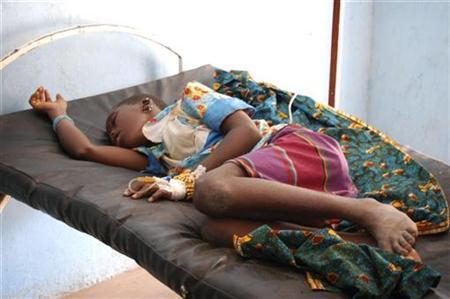Meningitis, a severe illness characterized by inflammation of the membranes surrounding the brain and spinal cord, poses a significant public health threat, particularly in the northern regions of Ghana, including the Upper West Region. The region’s location within the African meningitis belt, a geographical area stretching across sub-Saharan Africa, renders it highly vulnerable to recurrent epidemics. Dr. Sebastian Ngmenenso Sandaare, a Member of Parliament representing the Daffiama Bussie Issa constituency, has raised concerns about a recent outbreak in the Upper West Region, highlighting a disturbingly high case fatality rate of 23.33 percent. As of epidemiological week six, the region had reported 60 suspected cases and 14 deaths, underscoring the urgent need for intervention. The disease manifests with a sudden onset of fever, headache, stiff neck, nausea, and vomiting, and in severe cases, can progress to seizures and coma.
The Upper West Region’s vulnerability to meningitis outbreaks is exacerbated by a confluence of factors. Climatic conditions, particularly the dry and dusty Harmattan season, create an environment conducive to the spread of the bacteria responsible for meningitis. Overcrowding, prevalent in certain communities, facilitates transmission through close contact. Limited access to healthcare services, stemming from inadequate infrastructure and a shortage of healthcare professionals, impedes timely diagnosis and treatment. Socioeconomic conditions, including poverty and malnutrition, weaken immune systems and increase susceptibility to infection. Low vaccine coverage, attributed to logistical challenges and vaccine hesitancy in some communities, further contributes to the spread of the disease. Finally, cross-border movement between Ghana and neighboring countries within the meningitis belt poses challenges in containing outbreaks as infections can easily be introduced from high-risk areas.
Dr. Sandaare has identified several factors contributing to the high mortality rate observed in the recent outbreak. Delayed health-seeking behavior among individuals experiencing symptoms contributes to disease progression and increases the risk of severe complications. The emergence of new serotypes, or strains, of meningitis bacteria can pose challenges to existing treatment protocols and surveillance efforts. Shortages of essential medicines, including antibiotics required for effective treatment, hinder prompt and appropriate medical care. Limited laboratory capacity in the region restricts the ability to rapidly diagnose and confirm cases, delaying treatment initiation. Overburdened health staff, grappling with limited resources and high patient volumes, struggle to provide adequate care, further contributing to the high mortality rate.
To combat the ongoing outbreak and prevent future occurrences, Dr. Sandaare has called upon the government, international organizations such as the World Health Organization (WHO) and the United Nations Children’s Fund (UNICEF), and other stakeholders to mobilize financial and logistical support. This support should encompass providing essential medications, strengthening laboratory capacity, and bolstering healthcare infrastructure. Dr. Sandaare emphasizes the need for a comprehensive approach that addresses the underlying factors driving the recurring outbreaks. This includes strengthening the overall health systems in epidemic-prone regions, improving surveillance and early detection mechanisms, and enhancing community engagement and education.
Dr. Sandaare’s proposed strategies include strengthening meningitis outbreak preparedness through budgetary allocations for staff capacity building, prepositioning of essential medicines and supplies, and ensuring the availability of diagnostic tools. He advocates for equitable distribution of health workers across the country, employing innovative strategies to attract and retain healthcare professionals in underserved regions like the Upper West. Public health education campaigns are crucial to raise awareness about the signs and symptoms of meningitis, promote timely health-seeking behavior, and address vaccine hesitancy. Investing in healthcare infrastructure, including upgrading facilities, enhancing laboratory diagnostics capabilities, and providing specialized training to healthcare workers, is essential to improve the quality and accessibility of care.
Collaboration across borders is critical to effectively control the spread of meningitis within the African meningitis belt. Strengthening cross-border surveillance and information-sharing mechanisms allows for early detection of outbreaks and facilitates coordinated responses. Finally, Dr. Sandaare proposes the establishment of a public health emergency fund to ensure sustained funding for both current and future outbreaks. This fund would provide a dedicated resource pool to support rapid response efforts, strengthen preparedness measures, and enhance the resilience of the health system in the face of public health emergencies. Implementing these comprehensive strategies, backed by adequate resources and coordinated efforts, is essential to curb the recurring threat of meningitis outbreaks in the Upper West Region and safeguard the health of its population.














